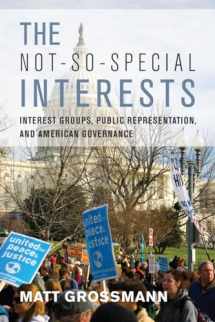
The Not-So-Special Interests: Interest Groups, Public Representation, and American Governance
ISBN-13:
9780804781152
ISBN-10:
080478115X
Edition:
1
Author:
Matt Grossmann
Publication date:
2012
Publisher:
Stanford University Press
Format:
Hardcover
248 pages
FREE US shipping
Book details
ISBN-13:
9780804781152
ISBN-10:
080478115X
Edition:
1
Author:
Matt Grossmann
Publication date:
2012
Publisher:
Stanford University Press
Format:
Hardcover
248 pages
Summary
The Not-So-Special Interests: Interest Groups, Public Representation, and American Governance (ISBN-13: 9780804781152 and ISBN-10: 080478115X), written by authors
Matt Grossmann, was published by Stanford University Press in 2012.
With an overall rating of 3.9 stars, it's a notable title among other
books. You can easily purchase or rent The Not-So-Special Interests: Interest Groups, Public Representation, and American Governance (Hardcover) from BooksRun,
along with many other new and used
books
and textbooks.
And, if you're looking to sell your copy, our current buyback offer is $0.47.
Description
"Lobbyist" tends to be used as a dirty word in politics. Indeed, during the 2008 presidential primary campaign, Hillary Clinton was derided for even suggesting that some lobbyists represent "real Americans." But although many popular commentators position interest groups as representatives of special―not "public"―interests, much organized advocacy is designed to advance public interests and ideas. Advocacy organizations―more than 1,600 of them―are now an important component of national political institutions. This book uses original data to explain why certain public groups, such as Jews, lawyers, and gun-owners, develop substantially more representation than others, and why certain organizations become the presumed spokespersons for these groups in government and media. In contrast to established theory and conventional wisdom, this book demonstrates that groups of all sizes and types generate advocates to speak on their behalf, though with varying levels of success. Matt Grossmann finds that the advantages of organized representation accrue to those public groups that are the most politically motivated and involved in their communities. Organizations that mobilize members and create a long-lasting presence in Washington become, in the minds of policymakers and reporters, the taken-for-granted surrogates for these public groups. In the face of perennial debates about the relative power of the people and the special interests, Grossmann offers an informed and nuanced view of the role of organizations in public representation and American governance.


We would LOVE it if you could help us and other readers by reviewing the book
Book review

Congratulations! We have received your book review.
{user}
{createdAt}
by {truncated_author}


